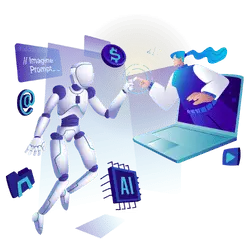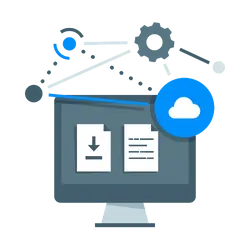The introduction with Artificial Intelligence (AI) in education is a possibility to revolutionize how we teach and learn. Automating administrative duties, AI can free up teachers’ time and allow teachers to concentrate on the interactions of students. The result could be better-designed and more engaging learning experiences and ultimately enhance the quality of education.

Present Challenges in Education
Teachers spend a large amount of their time on administration tasks like creating lessons, assigning grades and keeping track of student data. Administrative burdens leave little time to spend with students. It is hard to offer additional individualized education as well as support for the development of critical and imaginative thinking.
What AI Can Revolutionize Education
Automating administrative tasks
AI is able to take on many of the tedious and time-consuming assignments that teachers are currently tackling:
- Making Progress Reports AI is able to quickly collect information on the performance of students and produce detailed report on progress.
- Drafting email for parents: Automated systems can create and email parents to keep them updated about the progress of their child as well as any issues.
- Scheduling, Resource Management and AI is able to optimize the scheduling process and control class resources efficaciously, ensuring that students and teachers have everything they require.
Enhancing Teacher-Student Interactions
Automating administrative processes, AI allows teachers to spend more time on interaction with their students.
- One-on-1 Interactions With more time educators can participate with students in meaningful one-on-one conversations, aiding students in thinking in a critical and imaginative way.
- Enhancing Creative and Critical Thinking Teachers should be focused on developing and implementing courses and activities that promote the development of critical and creative thinking while helping students procure a greater comprehension of the content.
Personalized Learning Experiences
AI is able to tailor education experiences that meet the specific demands of each individual student.
- Customizing Lesson Plans for Teachers: AI can analyze the data of students to design custom lessons that target individual strengths and weak points.
- adaptive learning platforms The platforms can adjust the level of difficulty and material in accordance with the student’s performance and impart a personalised education path.
AI Tools and Applications in Education
Intelligent Tutoring Systems
Smart tutoring Systems help in providing individual feedback and assistance to students.
- Personalized Feedback AI provides immediate feedback on students’ their performance. This can benefit them increase and gain a better understanding of concepts.
- Real-time Performance Tracking: Teachers can monitor the progress of students in real time and make it possible to help in providing timely intervention.
Virtual Assistants
Virtual assistants may assist with diverse classroom management and administration duties:
- Administrative Tasks Virtual assistants take care of scheduling, reminders as well as other tasks in the administrative realm.
- Classroom Management AI is able to benefit organize classroom activities that warrant a pleasant and effective learning setting.
Automated Grading Systems
Automated grade systems cut down the amount of time teachers devote to the grading of assignments.
- Consistent Evaluations AI has the ability to bring reliable and impartial assessment of the work of students.
- A reduced workload: Teachers are able to reduce time spent on graders which allows them to concentrate more on teaching and engaging with their students.
Case Studies and Examples
Schools Implementation
Many schools have succeeded in integrating AI to their curriculums:
- Effect on Workload The schools seen a dramatic reduction in the workload of teachers as well as better student outcomes.
- Enhanced Learning Experiences AI tools allow for enhanced and personalized learning experiences for learners.
Educational Technology Companies
Top educational technology firms have developed new AI-powered solutions that are innovative:
- Innovative Technologies and Future developments: Companies are continuously developing new and more efficient and easy-to-use AI tools for teaching.
Advantages and potential challenges
Benefits
- Increased efficiency: AI automates repetitive tasks, increasing the efficiency and effectiveness.
- Individualized Learning AI allows personalized experiences in learning, addressing the individual needs of students.
- Support for Different needs: AI tools can help in providing better support to students who have different learning requirements.
Challenges
- Data Privacy Privacy and security is vital when it comes to integrating AI in the field of education.
- Teachers Training The teachers need education and assistance to be able to adjust to modern AI technology.
- The bias of Algorithms: Addressing potential biases within AI algorithms is crucial for warrant the most equitable and equal education.
Future Perspectives and trends
AI’s impact on the field of education is predicted to expand due to the new technology and new innovations influencing the future of learning and teaching. The connection between AI and educators is expected to keep evolving, while highlighting the necessity of balancing technological advancements with human interactions.
Conclusion
AI is poised to revolutionize education through automation of administrative duties and increasing interaction between teachers and students. In the midst of this futuristic world of AI, it’s essential to assure that the technology is compatible with and enhances the educational elements that are human.
FAQs
Q: How does AI benefit decrease the administrative burden of teachers? A: AI is able to automatize tasks like creating progress reports, writing emails and coordinating the schedule of teachers, which allows them to concentrate on their interaction with their students.
Question: What is Intelligent tutoring system? A: Intelligent tutoring systems offer individual feedback and assistance for students. This helps students boost and grasp concepts better.
What can automated systems for grading educators? A: Automated grade systems cut down on the amount of amount of time that teachers are spending working on assignments to grade, providing reliable and impartial evaluations, as well as giving teachers more time to teach.
Q What are the issues when the integration of AI into education? A: Challenges are a matter of protecting data privacy as well as providing training for teachers, and dealing with biases that might be present that may be present in AI algorithms.
Q: What’s the future for AI in the field of education? A: AI’s involvement in the field of education is likely to expand, as new technologies and new innovations defining the direction of learning and teaching by balancing technology and human interactions.


